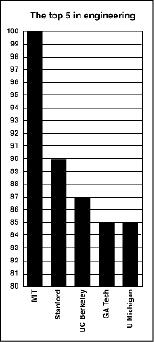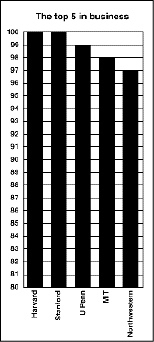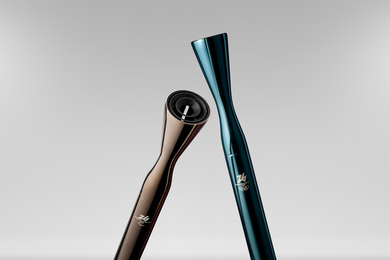MIT's School of Engineering continued its unbroken record since 1987 as the best engineering school in the nation, topping second-ranked Stanford by a wide margin of 10 points (100-90) in US News and World Report's 12th year of graduate school rankings.
In all, 21 graduate areas -- 10 departments and 11 graduate programs -- were ranked number one in MIT's Schools of Engineering, Humanities, Management and Science.
The Sloan School of Management placed a close fourth among business schools, with a rating of 98 compared to 100 for Harvard and Stanford, and 99 for the University of Pennsylvania.
The seven #1 departments in the School of Engineering were aerospace/aeronautical engineering; chemical engineering; computer engineering; electrical/electronic/communications engineering; materials engineering; mechanical engineering; and nuclear engineering. MIT was #2 in civil engineering and #4 in environmental/environmental health engineering.
In the School of Humanities and Social Science, the Department of Economics again tied for #1 with Harvard and Stanford. MIT ranked eighth in political science and 12th in psychology.
In the School of Science, the Department of Mathematics was first in the nation. MIT also ranked #1 in computer science, as well as in computer engineering. In addition, MIT departments finished in the top three in all the rated areas: biological sciences at #3, chemistry at #2, geology at #2 and physics at #3.
In the School of Architecture and Planning, the Department of Architecture was ranked #2, with a 4.4 rating (on a scale of 5) compared to Harvard's first-place 4.6 rating.
GRADUATE SPECIALTIES
In graduate specialty programs within the School of Humanities and Social Science, MIT was #1 in economics/industrial organization and in international economics, #2 in microeconomics and #3 in macroeconomics and in public finance.
In graduate programs within the School of Management, MIT ranked #1 in management information systems, production/operations management and quantitative analysis. MIT ranked 6th in entrepreneurship and 7th in finance.
In graduate programs within the US News category of sciences, MIT ranked first in inorganic chemistry, computer science hardware, computer science artificial intelligence, geological tectonics/structure, atomic/molecular physics and nuclear physics. The Institute ranked #2 in biochemistry/molecular, #5 in neurosciences, #6 in genetics and #7 in cell biology/developmental.
No specialty programs were listed in engineering.
In an e-mail interview with The Tech, President Charles M. Vest commented, "Such rankings are not too meaningful because they reduce a very complex topic to a few simple metrics. They reasonably identify clusters of strong institutions, but the hair-splitting of rank ordering them is not very meaningful. The focused ranking of professional schools such as engineering and business is more substantive than the ranking of entire institutions.
"The ranking of engineering is gratifying but should never be taken for granted. I was particularly pleased that the recent advances in engineering at MIT are being recognized by our peers. Our approach to bioengineering has differed from that of most other schools. It demonstrates that moving in ways we believe are best, rather than fitting what everyone else is doing, is the right approach.
"Many constituencies, including prospective students, pay more attention to rankings than I would like. Thus, it is helpful when we are highly ranked, but it should never drive our decisions. We will live up to strong rankings by striving for excellence and never being complacent," Dr. Vest said.
A version of this article appeared in MIT Tech Talk on April 5, 2000.







